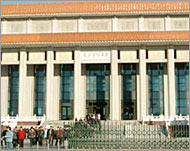To some people braving the cold of Beijing’s winter,
the desire to gaze upon their former ruler comes from genuine
respect for his achievements.
“I admire him,” proclaimed one retired worker,
surnamed Ma. “He was a great leader; he fought the Japanese and
united China. He was a master strategist and inspirational speaker.”
Others were not so willing to give praise. “I have
no interest in him,” opined one college student, “I was born after
his death and although he is seen as a respected figure, I have no
relationship with him.”
Her reaction offers a general insight into the
generational differences of opinion towards Chairman Mao.
Various views
According to Yang Tianshi, a professor of Modern
Chinese History at the Academy of Social Sciences, attitudes towards
Mao will vary depending upon age, social background and personal
experience.
For intellectuals like himself, one of the defining
moments of Mao’s legacy was the Cultural Revolution, a period of
brutal turmoil when students, encouraged to attack ‘rightist
elements’ within society often turned upon their own teachers and
each other with tragic consequences.
However, for non-intellectuals during Mao’s
leadership, Yang believes that now there is often nostalgia for
former times when life was “simpler, more egalitarian".
 |
|
Crowds have visited
Mao's crystal
coffin for over 20
years |
In China’s schools,
Mao is portrayed as the great leader, the man who united China after
decades of division at the hands of brutal warlords and foreign
imperialists.
He is described as a great idealist whose visionary
policies helped China industrialize and begin to regain her rightful
place among the world's leading nations.
Forgotten history
Although now officially recognized, little emphasis
is placed on his so-called ‘mistakes’, the Great Leap Forward of
1958-61 and subsequent famine in which some 20 million people
reportedly died, and the more infamous Cultural Revolution of
1966-69.
“We studied Mao in compulsory politics classes from
primary school until university,” explained Communist Party member
Audrey Li.
“We study his contributions to Marxist-Leninist
thought, we study his childhood, everything, even his poetry. In
many ways he was a prodigy, one that only appears every 1000
years.”
One of the more important things to take into
account when assessing Mao believes China historian Steve Smith, “is
to remember that what Chinese people know about Mao is limited and
heavily censored".
Revised and edited
A professor at Essex University, Smith points out
that even though Mao’s legacy has been revised (for example, the
labelling of the Cultural Revolution as a mistake) the Communist
Party that is in power today is the same Communist Party that
existed under Mao.
|
“On one hand, this is just
about making money off foreigners, on the other it is
indicative of how important Mao is too modern China, we cannot
escape him. This does not mean though that people idolise him;
just that his presence is part of our
lives”
Former Tiananmen Square
activist |
Any open and
uncensored re-examination of his legacy might question not just
Mao’s reputation but also that of the Communist Party.
Certainly, the range of literature on offer is
restricted.
According to Yang, only the government can sanction
official biographies on Mao although these, when they are written,
usually contain new material on Mao’s life.
For example, one work published in the 1990’s
recounted tales from a former bodyguard.
Entitled, Mao Zedong, Man not God, it painted a more
human side to the man - dwelling on his personal fallibilities.
Idolisation
Most foreign works, such as Mao’s former doctor Li
Zhisui’s revealing biography on the man's personal and political
machinations is not on sale although its contents, including Mao’s
apparently unquenchable sex drive are sometimes the stuff of local
jokes.
“Take into account,” explains Li Da, an organiser of
cultural study activities in Beijing, “that the current leadership
all grew up idolizing him, there is simply not the climate, either
politically or academically for a full and open revision of
him".
In popular society, though, there have been
interesting signs of remembrance.
|
“In many ways he was a
prodigy, one that only appears every 1000
years”
Audrey
Li,
Communist Party member
|
In the 1990’s, drivers began
hanging Mao icons in their vehicles as talisman while artists used
his image as a form of pop art. His face even adorned tacky little
cigarette lighters that are still popular with tourists.
One obsessive sculptor, Wang Wenhai has created over
1300 renditions of the man. With the largest standing at around
three metres tall, Wang is unrepentant about his choice of muse.
Nostalgia
"Mao was an impressive man whose speeches still have
resonance today. ‘Serve the people’ (one of Mao’s slogans) has as
much relevance to society as it did in the 1950’s. People should
still be listening to what he had to say,” he said.
For one artist and former Tiananmen Square activist
who preferred not to be named, recent cultural trends that appear to
romanticise Mao should not be taken too serious.
“On one hand this is just about making money off
foreigners, on the other it is indicative of how important Mao is to
modern China, we cannot escape him. This does not mean though that
people idolise him; just that his presence is part of our
lives.”
Looking forward, talk about reassessing his legacy
have reportedly been raised in government circles but there have not
been any public declarations made alluding to future
historiographies.
Now, with the Communist Party facing enough domestic
problems of its own trying to maintain credibility it appears
unlikely a potentially unsettling revision of the Party’s history
will be in the cards.